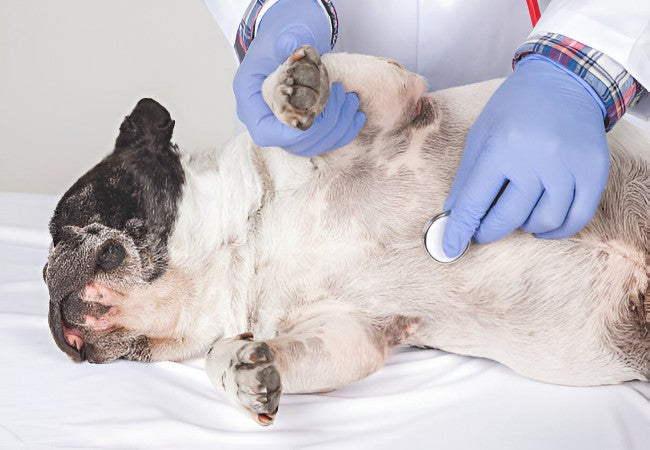Understanding Non‑Inflammatory Metabolic Myopathy in Dogs – Vet Guide 2025 🩺

In this article
Understanding Non‑Inflammatory Metabolic Myopathy in Dogs – Vet Guide 2025 🩺
By Dr. Duncan Houston BVSc
Hello, I’m Dr Duncan Houston, BVSc, founder of Ask A Vet, and in this 2025 update, we will explore non‑inflammatory metabolic myopathy—a complex but manageable muscle condition in dogs. Through empathy, values for clarity, and medical precision, we’ll walk through causes, diagnosis, treatment, and nutrition, all shaped to support loving pet caregivers like you. 🐾
📘 What Is Non‑Inflammatory Metabolic Myopathy?
This rare condition arises when muscle cells cannot properly convert nutrients into energy—usually due to enzyme or metabolic pathway defects—resulting in weakness and fatigue without inflammation in the muscles . In endocrine variants (e.g., hypothyroidism, Cushing’s), the muscle issues stem from hormonal imbalance .
✨ How Common Is It?
Though uncommon, certain breeds are predisposed: German Shepherds, Akitas, English Springer Spaniels, American Cocker Spaniels, Old English Sheepdogs, and Sussex Spaniels .
🔎 Signs & Symptoms
Symptoms vary depending on type and severity:
- Generalized weakness or exercise intolerance
- Muscle pain, stiffness, cramps, tremors
- Dark urine from rhabdomyolysis
- Esophageal dysfunction—regurgitation, difficulty swallowing, megaesophagus
- Stunted growth, pseudohypertrophy (enlarged muscles)
- Ventroflexion of head/neck, jaw cramps (trismus)
🧬 Underlying Causes
Metabolic myopathies are typically inherited enzymatic defects—affecting glycogen storage (e.g., PFK deficiency in springer spaniels ), fatty‑acid metabolism, or mitochondrial energy pathways. Others stem from endocrine disorders such as hypothyroidism or hyperadrenocorticism (Cushing’s) .
Environmental factors—drug toxicity, toxins, nutritional imbalances, infections—may also precipitate secondary metabolic issues .
🩺 Diagnosis: A Step‑by‑Step Approach
- History & physical exam: focus on onset, breeds at risk, exercise reaction.
- Blood work: CBC, chemistry, hormone panels (thyroid, adrenal) .
- Special tests: CK (creatine kinase), lactate/pyruvate, urine myoglobin.
- Neuromuscular tests: EMG, nerve conduction studies .
- Imaging: X‑rays for esophageal issues; muscle MRI if needed.
- Biopsy: confirmation through histopathology, enzyme assays, and metabolic storage findings .
- Genetic testing: for known breed‑specific disorders (e.g., PFK, phosphofructokinase deficiency) .
💊 Treatment & Ongoing Management
There’s no universal cure, but targeted strategies produce solid outcomes:
1. Address Underlying Conditions
- Endocrine myopathies: Treat hypothyroidism (levothyroxine), Cushing’s (trilostane); muscle function often improves slowly .
- Drug‑induced cases: Stop or reduce steroid use, statins .
2. Diet & Supplements
- Frequent small meals to stabilize blood sugar (avoid hypoglycemia) .
- High‑quality protein, easily digestible carbs, and medium‑chain triglycerides for energy.
- Supplementation with L‑carnitine, coenzyme‑Q, and riboflavin for lipid storage or mitochondrial myopathies .
3. Exercise & Physical Therapy
Balanced, low‑intensity exercise avoids overexertion. Physical rehab enhances muscle mass, flexibility, and energy use.
4. Symptomatic & Supportive Care
- Hospitalization and ICU support for rhabdomyolysis, seizures, and severe hypoglycemia .
- Feeding modifications—elevated bowls, feeding tubes if dysphagia present .
- Orthopedic tools—harnesses, non‑slip mats for joint support.
📊 Prognosis & Outlook
Outcomes depend on cause:
- Secondary cases (endocrine or drug): reversal is possible with treatment.
- Inborn genetic myopathies: lifelong management recommended. Avoid breeding to prevent passing genetic risk .
Supportive therapies and strict management help many dogs live comfortable, active lives.
🧬 Breed‑Specific Insights
- German Shepherds, Older Spaniel Breeds: Susceptible to storage diseases like PFK deficiency—look for muscle cramps and collapse.
- Labrador & Great Dane Myopathies: Breed‑specific onset with muscle wasting or tremors; supportive care like L‑carnitine supplementation is often helpful.
🏠 At‑Home Care Tips
- Track activity & feeding: Note weakness, panting, or urine changes.
- Practice gentle exercise: Short walks, swimming, and stretching guided by a vet or rehab professional.
- Maintain consistent meals: 3–4 small feeds per day to maintain energy balance.
- Monitor hydration: Ensure easy access to fresh water—especially important if rhabdomyolysis is present.
- Encourage enrichment: Mental stimulation prevents stress when physical activity is limited.
🔑 When to Seek Professional Help
- Worsening fatigue, inability to walk, or collapse
- Dark brown or red urine
- Worsened swallowing, choking, and pneumonia risk
- Hormone imbalance signs—like excessive thirst, hair loss
🧾 Summary
Non‑inflammatory metabolic myopathy is complex but manageable. Early diagnosis, balanced care, lifestyle adaptations, and partner‑based support empower dogs to thrive. As always, collaboration with your veterinarian and specialists ensures the best outcome.
💼 Ask A Vet
Looking for expert guidance? With Ask A Vet, you can chat instantly or book a consultation about your dog’s myopathy. When exercise needs to be moderated.
📲 Final Thoughts
I hope this detailed 2025 vet guide equips you with knowledge, empathy, and confidence. Metabolic myopathy doesn’t have to derail quality of life. With tailored treatment & ongoing care, your dog can enjoy comfort, engagement, and companionship for years to come.
For personalized support or follow‑up questions, reach out via Ask A Vet. Download our app for 24/7 guidance and veterinary care.






